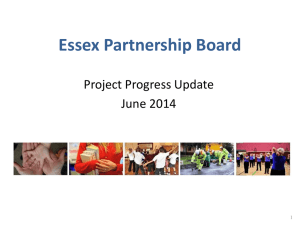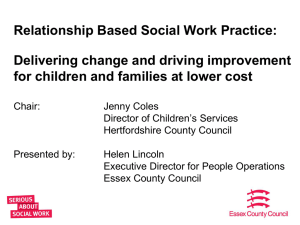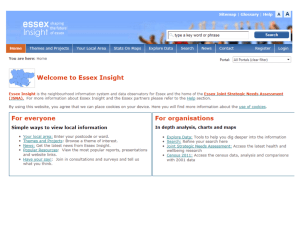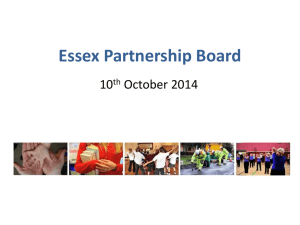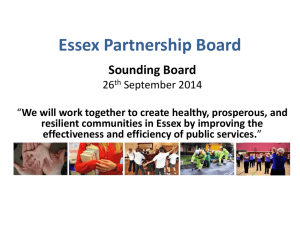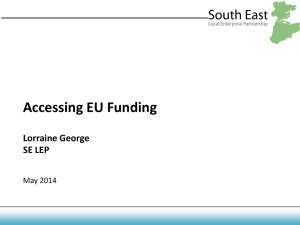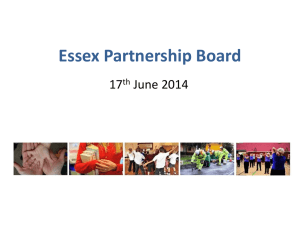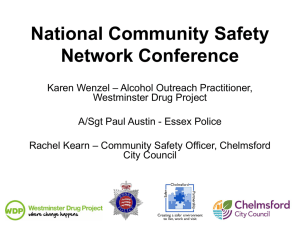Highlights - Essex Partnership Portal
advertisement
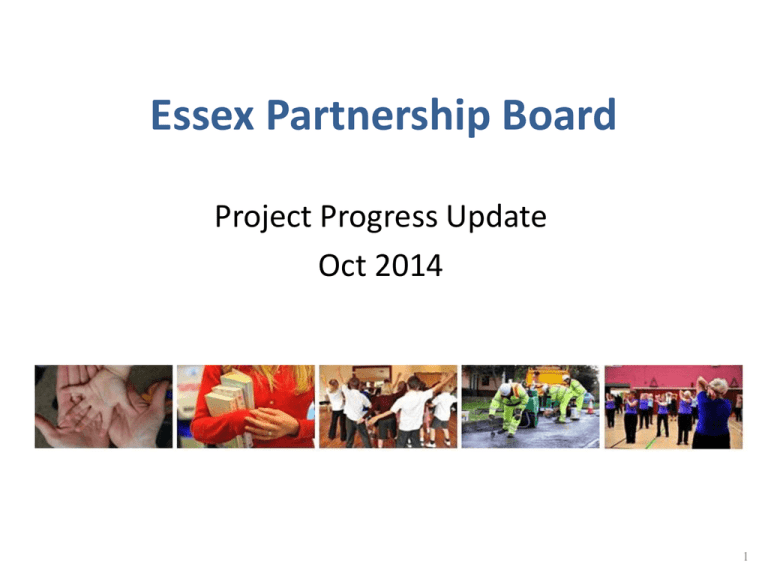
Essex Partnership Board Project Progress Update Oct 2014 1 Strengthening Communities Progress Report – October 2014 Highlights: VCS Framework - Progress made by the ECSG in securing sign up amongst partners identified as early adopters Youth Volunteering - Delivery sites briefed, procurement exercise for redevelopment of ‘Volunteer Essex’ website started Time/Care Banking - FBC approved , funding secured for 12 months of delivery starting August st Community Builders – Funding proposed to extend delivery in Tendring from 1 October to March 2015. Aspects of this work will be developed as part of the TCA bid Transformation Challenge Award – Expression of Interest for funding in 2015/16 supported. Business case in development, for completion by October 2014 Who Will Care? - Roll out of successful local schemes mobilised Next key activities: • Develop TCA bid with partners • Refine plans for delivery in 15/16 with partners • Address funding gap across the Strengthening Communities programme for 14/15 • Countywide roll out of Time & Care Banking and WWC schemes • Plan WWC Civic Innovation event • Redevelopment of ‘Volunteer Essex’ website to enable to the Youth Volunteering pilot Key Milestones End of Community Builders pilot in Tendring November October Youth Volunteering marketing begins Partners signed up to VCS Framework and Essex Compact December Youth Volunteering project goes live Who Will Care? Civic innovation event Key Challenges Funding – The programme has a funding shortfall for project delivery in 2014/15. Securing funding from partners to support schemes remains a challenge. Benefits/Outcomes – Although these have been defined for the Time & Care Banking and Youth Volunteering schemes , the overall programme outcomes are still in development. Robustly defining benefits, especially cashable, continues to be a challenging proposition with the type of work involved in the existing schemes. Benefit definition is an issue for the WWC workstreams although plans are in place to address this. Stakeholder Engagement – Improvements have been made through the revised membership of the SC group. This will be a challenge over the coming months as we liaise to develop our plans for 2015/16. Gaining partner sign up across the county for the VCS Framework also has the potential to be challenging for the ECSG. 2 Domestic Abuse Progress Report – October 2014 Highlights: • The Basildon & Braintree pilot ended on 31st July. The pilot supported 748 domestic abuse victims in total. An evaluation/closure report is currently being drafted • The DA strategic board has approved the development of the domestic abuse programme for schools and colleges • The perpetrator workstream has commissioned research on existing perpetrator programmes across the county • A collaboration agreement required for partners to sign off before publishing the Support Services contract specification is being drafted • A JDATT & MARAC Operational Governance group has been created. The group will have operational oversight of the JDATT & MARAC and report to the Southend, Essex and Thurrock Domestic Abuse strategic board Next key activities • Agree details and locations of case finding pilots with NHS partners • Advertise and publish the Support Services (IDVA) FY2015/16 contract specification Key Milestones(include achieved milestones over last 2 months & next 2 months) Jul Victim Support IDVA’s operational Acc. & Support pathways mapped Basildon & Braintree pilot ends Implement interim JDATT IS solution Aug DA prog. for school’s - Proposal approved Sep Safer Places DA prog for school’s – IDVA’s operational Development commences Oct Basildon & Braintree pilot – closure report Safer Accommodation – Countywide reciprocal agreement signed off Nov Safer Accommodation – Information Sharing Agreement signed off Key Challenges: • Stakeholders – There is a good level of engagement with partners across board. However, more engagement with health partners will be welcome • Outcomes/Benefits – Clarity on outcomes and benefits expected from initiatives being implemented is required. A workshop to review required outcomes has been scheduled with partners across the domestic abuse partnership • Communications – The project does not currently have a joined up communications plan across partners to ensure stakeholders are aware of planned changes. We are currently working with partners to define stakeholder requirements and develop a communications plan 3 Reducing Reoffending Progress Report – October 2014 Highlights: • • • • • • Development of the joint commissioning plan for a Mental Health, Drugs/Alcohol and Learning Disability Offender service is proceeding well and the Joint Commissioning task group is providing input to the NOMS-ESF Employment, Training and Education/Skills funding retender The first property to be purchased with the Home Improvement Agency funding has been identified Offender demand pathways have been mapped and the costs associated with each pathway are currently being collated and analysed Essex CRC have recruited an additional 1 FTE post to the Essex and Southend Joint Domestic Abuse Triage Teams (JDATTs) and Thurrock MultiAgency Safeguarding Hub (MASH) A report on service user views developed by The Evidence Works has been shared with the RR board and other key stakeholders to inform future service developments The revised IOM performance report has been shared with the RR board and CSP’s Next key activities • • Take forward actions from the last EOAF workshop identifying ways to better support offenders by linking drug and alcohol providers and tenancy support with accommodation providers and improving communications between partners working with offenders Conduct an independent review of IOM in Essex Key Milestones Aug Jul Partnership Commissioning roadmap completed IOM performance framework completed and presented to RR board Sep Offender demand pathways mapped Probation officer for JDATTs/MASH recruited Nov Oct Victim Voice report completed Empty Homes Agreements signed off Key Challenges: • Benefits - The benefits profiled in the current business case is based on the MOJ model. A performance framework to ascertain the activities that drive the benefits will be developed • Stakeholders – There is good engagement from partners including mental health, however, greater CCG representation on the RR board and Joint Commissioning group will be welcome and add value. • Direction / Solution Design / Visibility – The first (and main) stage of the Transforming Rehabilitation to probation services have now been implemented. The Essex Community Rehabilitation Company (ECRC) is firmly embedded in the SET Reducing Reoffending partnership arrangements and the National Probation Service (NPS) is also beginning to link in. The new contracts for the Essex CRC will commence in April 2015. 4 Housing and Public Sector Land Progress Report – October 2014 Highlights: • Outline business case being presented to Essex Partnership Board in October • Fifth locality review underway in Braintree • Priority sites identified: 9.5 hectares of developable land for 600-900 units Next key activities: • Develop full business case for operating model • Partners to agree to funding principle of the operating model (up front investment is paid back from value (profit) created at a site level) • Complete detailed feasibility studies on key sites to develop business cases for investment to develop housing • Continue to develop the pipeline of land Key Milestones (next quarter) October 2014 Outline business case for operating model Feasibility studies and business cases for up to 25 sites April 2015 Full business case for operating model Key Challenges: • Solution Design, Approvals/Sign Off, Priority Alignment: approval of outline business case needed to close the gap • Customer Impact, Business Readiness and Transition Arrangements: partners to agree to adopting this new way of working, specifically to engage with the new operating model as part of their estate disposals process • Benefits: the operating model is an enabler to releasing benefits in the future through using public sector land to meet specialist and affordable housing objectives. 5 Family Solutions Progress Report – October 2014 Highlights: • Essex exceeded its interim target of ‘turning around’ 1,443 families by October 2014, passing this number in July 2014. As a result, Essex has qualified as an ‘Early Starter’ for Phase 2 • August ’14 saw an active caseload across the service of 728 families; a caseload figure which has seen a steady increase since FS inception - 349 in October ’13 and 596 in March ’14 • End of September ’14 figures indicate that nearly half (48%) of all closed FS episodes to date have either fully or at least partially met the targeted outcomes for the families involved. Key Milestones APR 14 Offender housing needs assessment MAY 14 Offender Voice report completed JUN 14 Commissioning roadmap developed AUG 14 Partners engaged to develop JWP’s SEP 14 Victim Voice report completed NOV 14 Restorative justice pilot DEC 14 Victim & Offender Voice report implementation plan 6 Skills for Growth Progress Report – October 2014 Highlights: • • • • • • • • Established the employer led Employment and Skills Board (ESB). Engagement events with employers, MPs and providers have taken place. Evidence base analysed and used to determine the Board’s priorities. ESB has set its priorities use of the Skills Investment Fund to deliver against its aims. The aim of this is to pump prime activities with the longer term aim of being supported through the Single Local Growth Fund (SLGF), ESF, private sector match and mainstream funding 3 programmes have been developed through the ESB and SIF – Digital Skills for Growth, Industry in School, Careers Tools and a Sector CPD pilot for tutors Meetings have been held with Essex Providers to discuss and debate the work of the ESB and how things may go forward through the LEP Employer Sector leads for ESB have established sector employers groups to work with providers/educators to alter or establish new provision to meet employer need & skills shortages ESB’s across the LEP are placed at the centre of the LEP skills agenda within its Strategic Economic Plan – driving an employer-led system Next key activities: • • Preparing for project closure in October 2014 Online portal due to launch in March 2015 after extended soft testing Key Milestones(include achieved milestones over last 2 months & next 2 months) October 2014 Project Closure Report March 2015 Portal live Key Challenges: • Taking our proposals forward through the SE LEP successfully. Much is still unknown about the process and timelines for how and when delivery will commence. * ESF – European Social Fund (proposals for deployment of funds over next funding round presented to government) SIF – Skills Investment Fund CIAG – Careers Information Advice and Guidance 7 Public Service Reform High-Level Delivery plan (2014-2015) Project Apr -14 May -14 PSR Portfolio/ Delivery Function Domestic Abuse Jun-14 Jul-14 Aug-14 EPB – 17th Jun Sep-14 SB – 26th Sep Support Services put out to tender Interim IT solution go-live Health partners join the JDATT Schools programme -Strategic approach agreed Identify benefits/outcomes and fill funding gap Comm. Builders Checkpoint review CRF fund go live Nov-14 Dec-14 EPB – 10th Oct Jan-15 Schools programme development Schools Programme developed & agreed VCS framework signed off by partners & approved by EPB Comm. Builders Checkpoint review Reducing Reoffending Housing Design of evaluation methodology End of Community Builder trial period Youth Vol. pilot set up & web portal go live Comm. Builders Checkpoint review Strategy responses to VCS Framework in place by partners – Apr 2015 Testing Empty Homes funding secured Go-live Next steps and key milestones to be discussed and agreed Property negotiations completed All Empty Homes Agreements with Thurrock Council signed off IOM performance framework completed and approved by RR board properties purchased Restorative Justice pilot go-live Partnership Commissioning roadmap completed Site 1 purchase decision OBC approved by ECC (OB) Mandate agreed Locality Reviews Complete Site 1 feasibility 1 In progress PHSE development Closure report approved by EPB Sites 2-4 identified Completed Support Services team golive Support Services provider selected Timebanking established countrywide Online portal launched Mar-15 EPB – 17th Dec Basildon & Braintree pilot closure report Time/carebanking FBC Approval Skills Feb-15 Basildon & Braintree pilot closure report completed Countywide reciprocal agreements and ISA agreed Probation & Adult Social Care join the JDATT Strengthening Communities Oct-14 At risk Slipped Site 2-4 feasibility 1 OBC approved by EPB ECC investment approved by Outcomes Board Site 1 feasibility 2 Site 3 develop decision (ECC) Site 4 develop decision (TBC) Site 2 purchase decision (TBC) FBC for model (TBC)
